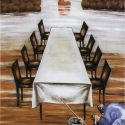Grethe Stenbæk Jensen was born in a family belonging to Indre Mission (the Church Association for the Inner Mission in Denmark), an evangelical branch of the Church of Denmark. They were smallholders in western Jutland. She left school after the seventh grade and became a housewife and politically active in the campaign against nuclear weapons and in the Socialist People’s Party. After receiving medical advice for mental health problems, she took a job at an egg packing station in 1971 and subsequently wrote the diary novel Konen og æggene, 1973, about the dreary and degrading job of a female unskilled worker. Her novel, which brought her fame as a working-class author and generated a discussion about the genre, was followed by accounts about the lives of working-class women in western Jutland, Waterloo retur. 10 beretninger, (SS), 1979, and Martha! Martha! (N), 1980.
Her series of partially autobiographical novels about Thea, a girl from a smallholding and her life from World War II to the EEC referendum in 1972, is a description of her childhood milieu: Thea, 1984, Dagen lang, 1985, Ud af stedet, 1987, and Med tiden, 1990. Similarly, her novels Anes bog, 1992, and Kære faster, 1994, document women’s lives in rural communities.
Additions by the editorial team 2011:
The above biography was first published in 1998. Since then, Grethe Stenbæk Jensen wrote the book Angående Gudrun, 1998.


